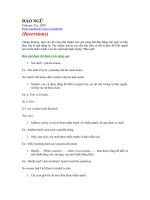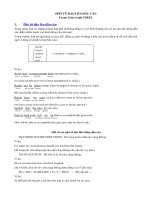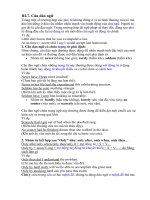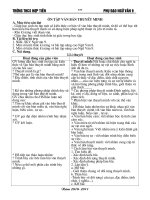INVERSION( ĐẢO NGỮ)
Bạn đang xem bản rút gọn của tài liệu. Xem và tải ngay bản đầy đủ của tài liệu tại đây (335.7 KB, 17 trang )
INVERSION
I. What is inversion?
When we begin a sentence with a
negative adverb or adverbial phrase, we
sometimes have to change the usual
word order of subject and verb (often
using an auxiliary verb such as do)
INVERSION
Negative adverbials include:
never, never before, rarely,
seldom, barely/hardly, scarcely…
when, no sooner than nowhere,
not only, etc.
INVERSION
Normal word order in a statement: S
+ V:
I have never seen so many people
in one room.
Inversion:
Never have I seen so many people
in a room.
.
INVERSION
No sooner had I put the phone down
than it rang again.
Hardly/ Scarcely/ Barely had I got
my breath back when it was time to go
again.
INVERSION
We use inversion with phrases that begin
with “not”
Not until he apologizes will I speak to
him.
Not for one minute do I imagine
they’ll come back.
INVERSION
We use inversion with some time phrases
that use “only”:
Only after several weeks did she
begin to recover.
Only later did she realize what had
happened.
INVERSION
We use inversion with some time phrases
that use “only”:
Only then did he remember he
hadn’t got his keys.
Only when I’ve finished this will I be
able to think about anything else.
INVERSION
Only by patience and hard work
will she find a solution.
Only in this way do we stand any
chance of success.
INVERSION
We use inversion after negative
adverbials which emphasize
frequency at the beginning of a
sentence:
Hardly ever did she wear a suit.
Little did she realize what was
about to happen.
INVERSION
After expressions with prepositions
+no:
In no way should this be
regarded as one of the matter.
At no time did they actually
break the rules of the game
On no account are you to repeat
it to any one.
Under no circumstances can we
accept the offer.
INVERSION
After expressions with not …
Not until August did the
government order an inquiry into
the accident.
Not a single word has she written
since the exam started.
INVERSION
Inversion after ‘so + adj…… that’
Her business was so successful that
Marie was able to retire at the age of 50.
So successful was her business, that
she was able to retire at the age of 50.
INVERSION
Inversion after ‘such + be…… that’
The play is so popular that the theatre
is likely to be full every night.
Such is the popularity of the play that
the theatre is likely to be full every night.
INVERSION
Inversion after adverbial phrases of
direction or place
Her father stood in the doorway.
In the doorway stood her father.
His mother sat in the armchair.
In the armchair sat his mother.
INVERSION
Inversion after in comparisons with ‘as’
and ‘than’
The cake was excellent, as was the
coffee.(……… as the coffee was)
Research shows that children living in
villages watch more television than do
their counterparts in inner city areas,
(…….than their counterparts do)
INVERSION
Inversion in conditional sentences
If you need more information, please
telephone our main office.
Should you need more information,
please telephone our main office.
If Alex had asked, I would have been
able to help.
Had Alex asked, I would have been
able to help.
INVERSION
Not using inversion:
We use inversion when the adverb
modifies the verb, and not when it
modifies the noun:
Hardly anyone knows about it,
(=no inversion)









